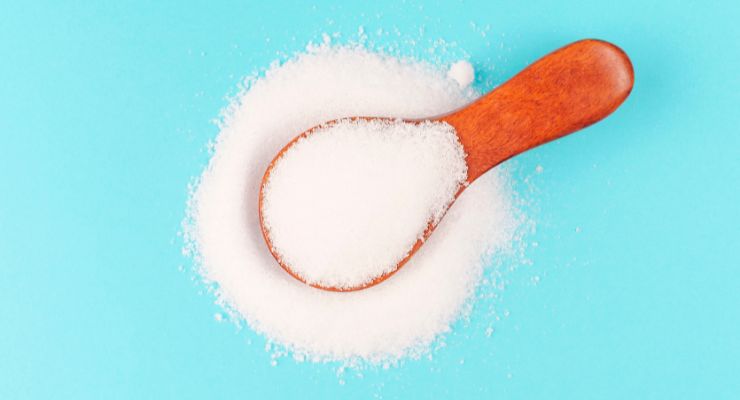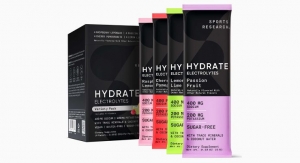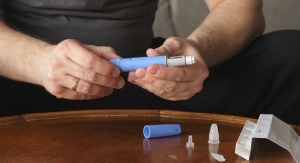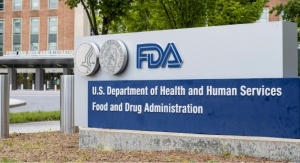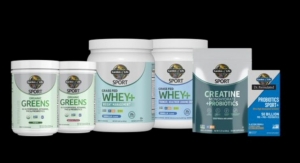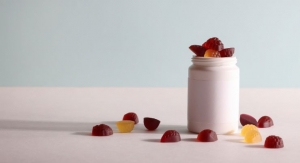05.22.23
The World Health Organization (WHO) released a new guideline in which advises against the use of non-sugar sweeteners (NSS) for weight loss, and instead recommends a less sweet diet overall.
The recommendation stems from a systematic review of available evidence, which suggests that while the use of NSS may result in short-term weight loss, there is no long-term benefit in reducing body fat in adults or children. Results of the review also suggest that there may be a link between the use of NSS and an increased risk of type 2 diabetes, cardiovascular diseases, and mortality in adults.
"Replacing free sugars with NSS does not help with weight control in the long term. People need to consider other ways to reduce free sugars intake, such as consuming food with naturally occurring sugars, like fruit, or unsweetened food and beverages,” says Francesco Branca, WHO director for nutrition and food safety. "NSS are not essential dietary factors and have no nutritional value. People should reduce the sweetness of the diet altogether, starting early in life, to improve their health."
The recommendation applies to anyone without pre-existing diabetes, and includes all synthetic and naturally-occurring or modified non-nutritive sweeteners, including those which are meant to be added to foods and beverages as well as those that exist in manufactured foods and beverages.
Common non-sugar sweeteners include acesulfame K, aspartame, advantame, cyclamates, neotame, saccharin, sucralose, stevia, and stevia derivatives. However, the recommendation doesn’t apply to low-calorie sugars or sugar alcohols, which are sugar derivatives which contain calories.
WHO noted that the review’s evidence might be cofounded by baseline characteristics of study participants, and the complicated patterns of NSS use. “Policy decisions based on this recommendation may require substantive discussion in specific country contexts, linked for example to the extent of consumption in different age groups,” WHO reports.
Review Details
The review, commissioned and published in 2019, included studies in generally healthy populations of adults, children, and pregnant women. Studies conducted in overweight, obese, or mixed-weight populations were included, but excluded pre-diabetic or diabetic populations. Studies on sugar alcohols and caloric sweeteners were also excluded.
In total, the authors of the review included 50 RCTs, 97 prospective cohort studies, 47 case-control studies assessing cancer outcomes, 5 nonrandomized controlled trials, 69 cross-sectional studies, and 15 ongoing trials with unpublished results.
The primary outcomes assessed in the studies included measures of adiposity, type 2 diabetes and prediabetes, heart diseases, cancer, dental caries, chronic kidney disease, eating behavior, sweet preference, neurocognition, mood, behavior, and asthma/allergies. Studies had to have a minimum follow up of 13 days for blood lipid outcomes, one year for disease incidence outcomes, and one week for all other outcomes in adults and children. No restrictions on follow-up time were included for pregnant women.
Adiposity
In 32 trials which evaluated the impact of NSS on adiposity, higher intakes of NSS resulted in a mean reduction in body weight of 0.71 kg, and -0.14 kg/m2 in body weight, which was not statistically significant.
“Greater weight reduction in trials of longer duration was suggested by subgroup analysis and meta-regression; however, results were not statistically significant for either,” the authors wrote. Results of other subgroup analyses did not suggest meaningful differences in caloric energy intake, hunger, or appetite and desire to eat as a result of NSS use, the authors noted.
Unsurprisingly, however, sugar intake was significantly reduced by those who used NSS.
Type 2 Diabetes
Twelve prospective cohort studies reported on links between NSS use and the risk of developing type 2 diabetes. Across the studies, higher intakes of NSS were associated with a significantly increased risk of developing type 2 diabetes, regardless of whether it was consumed in a beverage form (a 23% increase in risk) or added to foods or beverages by the consumers (a 34% increase in risk).
This effect was not significantly effected by BMI, the authors noted. They also noted that higher intakes of NSS were linked with a 21% increase in elevated fasting glucose, which is considered an intermediate marker of developing type 2 diabetes.
All-Cause Mortality
Seven prospective cohort studies reported on the risk of all-cause mortality. Highest intakes of NSS-containing beverages were linked to a 12% increase in risk of all-cause mortality. There was little impact on results when cases were excluded from the first three to eight years of follow-up.
The impact was attenuated when adjusted for incident hypertension, hypercholesterolemia, type 2 diabetes, coronary heart disease, and stroke in the Nurses’ Health Study cohort, but was still significant for those who consumed four or more NSS-sweetened beverages daily. The association was stronger across the studies which didn’t adjust for BMI, meaning that BMI was a relevant cofounding factor.
Cardiovascular Diseases
The review included four cohort studies on the risk of cardiovascular mortality. Across the studies, higher intakes of NSS-containing beverages were linked to a 19% increase in risk of cardiovascular disease mortality.
This included a 32% increase in risk of cardiovascular events; a nonsignificant increase in coronary heart disease; a 19% increase in risk of any kind of stroke; and a 13% increase in hypertension. However, no connections to intermediate markers of disease were confirmed.
“Relatively fewer studies were found on children, and results were largely inconclusive,” the authors noted. “Results for pregnant women suggest that higher NSS intake is associated with increased risk of preterm birth (low certainty evidence) and possibly adiposity in offspring (very low certainty evidence).”
Conclusions
“NSS use may lead to small reductions in adiposity without any significant impact on cardiometabolic risk. There is suggestion of negative health effects with long-term use, but the evidence is ultimately inconclusive,” the authors concluded. They also noted that there were no links between NSS use and diseases/mortality in randomized, controlled trials, and these links were only present in prospective cohort studies.
The authors noted that the ‘reverse causation’ phenomena may have also been at play in prospective cohort studies, meaning that populations could have increased NSS use as a reaction to elevated BMI or other metabolic diseases. “Many of the authors of the cohort studies took great lengths to address it. They undertook extensive adjustments for potential confounders and robust sensitivity analyses to test the impact of removing data that might contribute to reverse causation – for example, excluding data from the first several years after baseline assessment, or from participants with identified risk factors for disease, or who had experienced unplanned weight change prior to baseline assessment.”
Industry Reaction
The Calorie Control Council, a trade association representing the sweeteners industry, stated that it strongly disagrees with WHO’s recommendation.
The organization characterized it as being at odds with the health and nutritional profiles of half of Americans, based on the potential sweeteners have to reduce excess sugar in the average American diet. The association pointed to evidence that low- and no-calorie sweeteners don’t raise blood glucose or insulin levels, and help to lower carbohydrate intake when used as a replacement for sugar as intended.
“It is worth noting the recommendation is ‘conditional,’ which is used when the evidence supporting the recommendation is less than certain. In the case of the current guideline, most of the evidence used to support the recommendation was graded as ‘very low’ to ‘moderate.’ Further, the guideline notes the use of low- and no-calorie sweeteners contributes to reductions in key outcomes such as body weight and body mass index, only to issue a recommendation against their use,” the organization stated.
“A substantial body of scientific evidence shows that low- and no-calorie sweeteners provide effective and safe options to reduce sugar and calorie consumption. The world’s most highly regarded health and regulatory agencies have thoroughly reviewed this evidence and have validated the role of these ingredients. Along with exercise and a healthy diet, low- and no-calorie sweeteners are a critical tool that can help consumers manage body weight and reduce the risk of non-communicable diseases,” said Robert Rankin, president, Calorie Control Council.
The fact that the review excluded diabetic trial participants, for whom non-sugar sweeteners play an especially meaningful role, were not considered is “mind-boggling,” said Dr. Keith Ayoob, scientific advisor, Calorie Control Council. “Their doing so dismisses the value and usefulness of NSS for persons living with diabetes and pre-diabetes, which accounts for far in excess of 10% of the global population.”
The recommendation stems from a systematic review of available evidence, which suggests that while the use of NSS may result in short-term weight loss, there is no long-term benefit in reducing body fat in adults or children. Results of the review also suggest that there may be a link between the use of NSS and an increased risk of type 2 diabetes, cardiovascular diseases, and mortality in adults.
"Replacing free sugars with NSS does not help with weight control in the long term. People need to consider other ways to reduce free sugars intake, such as consuming food with naturally occurring sugars, like fruit, or unsweetened food and beverages,” says Francesco Branca, WHO director for nutrition and food safety. "NSS are not essential dietary factors and have no nutritional value. People should reduce the sweetness of the diet altogether, starting early in life, to improve their health."
The recommendation applies to anyone without pre-existing diabetes, and includes all synthetic and naturally-occurring or modified non-nutritive sweeteners, including those which are meant to be added to foods and beverages as well as those that exist in manufactured foods and beverages.
Common non-sugar sweeteners include acesulfame K, aspartame, advantame, cyclamates, neotame, saccharin, sucralose, stevia, and stevia derivatives. However, the recommendation doesn’t apply to low-calorie sugars or sugar alcohols, which are sugar derivatives which contain calories.
WHO noted that the review’s evidence might be cofounded by baseline characteristics of study participants, and the complicated patterns of NSS use. “Policy decisions based on this recommendation may require substantive discussion in specific country contexts, linked for example to the extent of consumption in different age groups,” WHO reports.
Review Details
The review, commissioned and published in 2019, included studies in generally healthy populations of adults, children, and pregnant women. Studies conducted in overweight, obese, or mixed-weight populations were included, but excluded pre-diabetic or diabetic populations. Studies on sugar alcohols and caloric sweeteners were also excluded.
In total, the authors of the review included 50 RCTs, 97 prospective cohort studies, 47 case-control studies assessing cancer outcomes, 5 nonrandomized controlled trials, 69 cross-sectional studies, and 15 ongoing trials with unpublished results.
The primary outcomes assessed in the studies included measures of adiposity, type 2 diabetes and prediabetes, heart diseases, cancer, dental caries, chronic kidney disease, eating behavior, sweet preference, neurocognition, mood, behavior, and asthma/allergies. Studies had to have a minimum follow up of 13 days for blood lipid outcomes, one year for disease incidence outcomes, and one week for all other outcomes in adults and children. No restrictions on follow-up time were included for pregnant women.
Adiposity
In 32 trials which evaluated the impact of NSS on adiposity, higher intakes of NSS resulted in a mean reduction in body weight of 0.71 kg, and -0.14 kg/m2 in body weight, which was not statistically significant.
“Greater weight reduction in trials of longer duration was suggested by subgroup analysis and meta-regression; however, results were not statistically significant for either,” the authors wrote. Results of other subgroup analyses did not suggest meaningful differences in caloric energy intake, hunger, or appetite and desire to eat as a result of NSS use, the authors noted.
Unsurprisingly, however, sugar intake was significantly reduced by those who used NSS.
Type 2 Diabetes
Twelve prospective cohort studies reported on links between NSS use and the risk of developing type 2 diabetes. Across the studies, higher intakes of NSS were associated with a significantly increased risk of developing type 2 diabetes, regardless of whether it was consumed in a beverage form (a 23% increase in risk) or added to foods or beverages by the consumers (a 34% increase in risk).
This effect was not significantly effected by BMI, the authors noted. They also noted that higher intakes of NSS were linked with a 21% increase in elevated fasting glucose, which is considered an intermediate marker of developing type 2 diabetes.
All-Cause Mortality
Seven prospective cohort studies reported on the risk of all-cause mortality. Highest intakes of NSS-containing beverages were linked to a 12% increase in risk of all-cause mortality. There was little impact on results when cases were excluded from the first three to eight years of follow-up.
The impact was attenuated when adjusted for incident hypertension, hypercholesterolemia, type 2 diabetes, coronary heart disease, and stroke in the Nurses’ Health Study cohort, but was still significant for those who consumed four or more NSS-sweetened beverages daily. The association was stronger across the studies which didn’t adjust for BMI, meaning that BMI was a relevant cofounding factor.
Cardiovascular Diseases
The review included four cohort studies on the risk of cardiovascular mortality. Across the studies, higher intakes of NSS-containing beverages were linked to a 19% increase in risk of cardiovascular disease mortality.
This included a 32% increase in risk of cardiovascular events; a nonsignificant increase in coronary heart disease; a 19% increase in risk of any kind of stroke; and a 13% increase in hypertension. However, no connections to intermediate markers of disease were confirmed.
“Relatively fewer studies were found on children, and results were largely inconclusive,” the authors noted. “Results for pregnant women suggest that higher NSS intake is associated with increased risk of preterm birth (low certainty evidence) and possibly adiposity in offspring (very low certainty evidence).”
Conclusions
“NSS use may lead to small reductions in adiposity without any significant impact on cardiometabolic risk. There is suggestion of negative health effects with long-term use, but the evidence is ultimately inconclusive,” the authors concluded. They also noted that there were no links between NSS use and diseases/mortality in randomized, controlled trials, and these links were only present in prospective cohort studies.
The authors noted that the ‘reverse causation’ phenomena may have also been at play in prospective cohort studies, meaning that populations could have increased NSS use as a reaction to elevated BMI or other metabolic diseases. “Many of the authors of the cohort studies took great lengths to address it. They undertook extensive adjustments for potential confounders and robust sensitivity analyses to test the impact of removing data that might contribute to reverse causation – for example, excluding data from the first several years after baseline assessment, or from participants with identified risk factors for disease, or who had experienced unplanned weight change prior to baseline assessment.”
Industry Reaction
The Calorie Control Council, a trade association representing the sweeteners industry, stated that it strongly disagrees with WHO’s recommendation.
The organization characterized it as being at odds with the health and nutritional profiles of half of Americans, based on the potential sweeteners have to reduce excess sugar in the average American diet. The association pointed to evidence that low- and no-calorie sweeteners don’t raise blood glucose or insulin levels, and help to lower carbohydrate intake when used as a replacement for sugar as intended.
“It is worth noting the recommendation is ‘conditional,’ which is used when the evidence supporting the recommendation is less than certain. In the case of the current guideline, most of the evidence used to support the recommendation was graded as ‘very low’ to ‘moderate.’ Further, the guideline notes the use of low- and no-calorie sweeteners contributes to reductions in key outcomes such as body weight and body mass index, only to issue a recommendation against their use,” the organization stated.
“A substantial body of scientific evidence shows that low- and no-calorie sweeteners provide effective and safe options to reduce sugar and calorie consumption. The world’s most highly regarded health and regulatory agencies have thoroughly reviewed this evidence and have validated the role of these ingredients. Along with exercise and a healthy diet, low- and no-calorie sweeteners are a critical tool that can help consumers manage body weight and reduce the risk of non-communicable diseases,” said Robert Rankin, president, Calorie Control Council.
The fact that the review excluded diabetic trial participants, for whom non-sugar sweeteners play an especially meaningful role, were not considered is “mind-boggling,” said Dr. Keith Ayoob, scientific advisor, Calorie Control Council. “Their doing so dismisses the value and usefulness of NSS for persons living with diabetes and pre-diabetes, which accounts for far in excess of 10% of the global population.”

